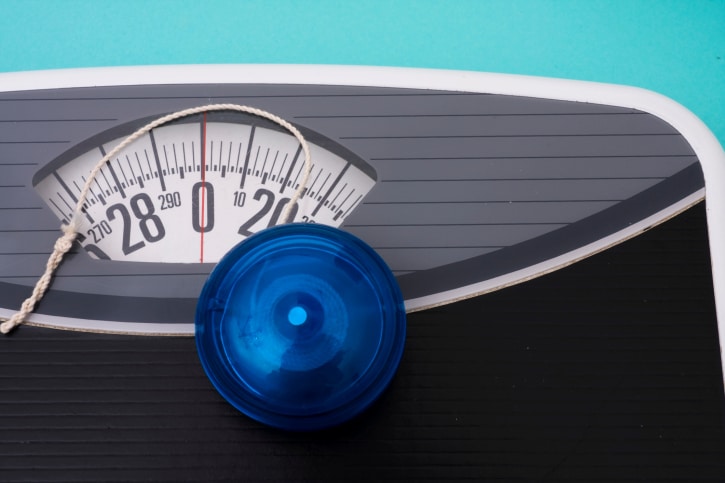 All you have to do is wheel your grocery cart into a checkout line to see the cautionary tales screaming at you from the tabloids: celebrities struggling to get thin and stay that way.
All you have to do is wheel your grocery cart into a checkout line to see the cautionary tales screaming at you from the tabloids: celebrities struggling to get thin and stay that way.
It makes you wonder: “If these rich and powerful people, with their personal trainers and private chefs, can’t win the weight war, what chance do I have?”
It doesn’t help that the statistics are grim: By some estimates, more than 80 percent of people who have lost weight regain all of it, or more, after two years. Recent studies have also linked the gain-lose-gain cycle to such potentially life-threatening conditions as high blood pressure, high cholesterol, diabetes, depression, heart disease, and cancer.
Understanding Metabolic Math
While small fluctuations on the scale are normal, the unhealthy behavior that experts refer to as “weight cycling” is not. Cycling is defined as a significant increase or decrease of body weight (generally 10 pounds or more) that occurs multiple times.
Experts believe a yo-yo pattern is often the result of a diet that’s too restrictive, and a study reported in the journal Obesity backs that up: “It found that people who followed a very low-calorie diet regained significantly more weight than those on a more forgiving plan,” says Judith Beck, Ph.D., director of the Beck Institute of Cognitive Therapy and author of The Beck Diet Solution. “If you lose weight on 1,200 calories a day, the minute you go up to 1,300 is the minute you start gaining weight.”
Why does your own metabolism thwart you? Simple, says Kelly Brownell, M.D., director of the Rudd Center for Food Policy and Obesity at Yale University: “The body may perceive dieting as a threat to its survival. It might not know the difference between Atkins and famine.”
Born to Rebound?
It’s bad enough that your body fights you when you try to lose weight. Now there’s compelling research to show that some people may be hardwired to yo-yo.
The problem, most experts feel, is that most people have never learned the skills needed for long-term behavior change. “They haven’t been taught how to motivate themselves every day,” Brownell says, “or how to respond to negative thoughts and recognize a mistake as a one-time thing.”
Risky Bigness
While watching the numbers on the scale fluctuate wildly is a blues inducer and clothes-budget buster, there are far more compelling reasons to be steady. For one, your metabolism might be affected — and not in the way you probably hoped.
Lost muscle. The more times you yo-yo, the theory goes, the more fat your body gains in each rebound. Because muscle burns 10 times more calories than fat does, your metabolism eventually will slow to a crawl. “If you go on a very strict diet and gain the weight back quickly, you might lose a lot of muscle and regain a lot of fat,” says Keith Ayoob, M.D., R.D., an associate professor at the Albert Einstein College of Medicine. “Then your metabolism operates on a slower idle, which means it’s going to be harder to lose weight as time goes on.”
Added stress to the body. “Losing and gaining regularly takes a huge toll on your body,” Ayoob says. Beyond aesthetics, such as a loss of skin elasticity, regaining weight burdens your arteries and skeletal system, and may stress the liver, which can become covered in fat.
Added heart problems. Yo-yoing also does a number on your ticker: A study in Clinical Cardiology found that women who weight cycle five times or more during their lifetimes may be damaging their hearts in the process.
Lost immunity. But perhaps most startling is the dangerous and lasting effect weight cycling has on the immune system. According to the first study of the long-term impacts of yo-yo dieting, women who repeatedly lost and gained weight had lower immune function, particularly lower counts of natural killer cells.
“These cells are important for fending off infections and are also vital in fighting the early stages of cancer,” says Cornelia Ulrich, M.D., of the Fred Hutchinson Cancer Research Center in Seattle. Low killer-cell activity is associated with higher rates of cancer. I
With so many drawbacks, you might wonder if you’d be better off just accepting your belly rolls. But the perils of being overweight still outweigh the risks of yo-yoing. So how do you quit the cycle for good? Despite what you read in the tabloids, it is possible.
Ultimately, What You Need To Do Is…
• Be realistic. “Make sure your diet is one you can stick with,” says Anne Fletcher, R.D., author of Thin for Life. No crash diets or fads that will be impossible to maintain. In fact, reconsider the whole notion of dieting as a temporary fix. Think of what you’re doing as a permanent lifestyle shift.
• Be patient. Don’t try to lose too much too soon. A healthy goal for slimming down, according to the National Institutes of Health, is to reduce your weight by approximately 10 percent over six months.
• Be supported. Researchers have found that socializing with others who have successfully lost weight improves your odds of maintaining your own weight loss. So enlist a buddy or join a group.
• Be analytical. Record your mood changes and hunger levels so you can learn to distinguish when you’re eating for emotional reasons.
• Be vigilant. “If you lose 30 pounds and then gain three, it’s easy to think that’s no big deal. But it’s a slippery slope,” says Gary Foster, Ph.D., director of the Center of Obesity Research and Education at Temple University in Philadelphia. Especially if you have a history of yo-yoing. Weigh yourself weekly, and have a clear plan of action ready if the scale swings too far.
• Be flexible. “Switch eating plans if you get bored,” says Michael Dansinger, M.D., weight-loss and nutrition advisor for The Biggest Loser and assistant professor at Tufts School of Medicine in Boston. Research indicates you’re more likely to be successful.
• Be active. Besides consuming a low-calorie, low-fat diet and being mindful about self-monitoring, you must exercise. This doesn’t mean you have to train for a marathon: Half an hour of walking every day is all you need to burn calories, build muscle, temper cravings, and increase “feel good” endorphin levels.
• Be optimistic. “One of the most important tips for being a successful weight loser is not to let past failed attempts keep you from trying again,” Dansinger says. Every time you fail, you get more insight about what to do differently next time.








